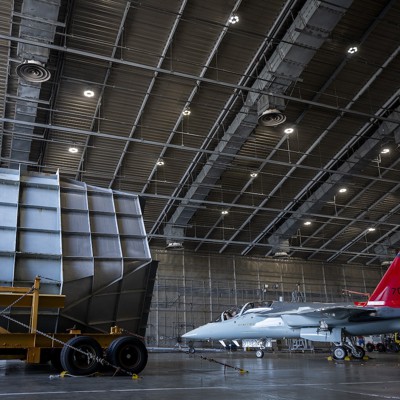Boeing leaders say they are not concerned about the impact of 3,200 union workers going on strike next week at three St. Louis-area facilities that produce fighter jets and munitions.
The number of workers planning to strike is an “order of magnitude less” than the 30,000 machinists who went on strike last fall in the Pacific Northwest, CEO Kelly Ortberg said Tuesday during the company’s second quarter earnings call.
“I wouldn’t worry too much about the implications of the strike. We’ll manage our way through that,” Ortberg said.
On Sunday, union members working on multiple U.S. military fighter jet programs rejected a proposed contract, paving the way for a strike next week. Boeing has “activated our contingency plan” and is “focused on preparing for a strike,” Dan Gillian, Boeing’s vice president of air dominance and general manager and senior executive in St. Louis, said in a statement.
The workers build and assemble parts for the F/A-18, F-15, T-7 trainer, and MQ-25 drone. The facilities also will be a major contributor to the future sixth-gen F-47, which will be centered in St. Louis. And while top executives may not be worried about how the strike will affect their business, the news is yet another challenge for a company trying to turn the corner on several delayed and over-budget defense programs.
Fixed-price development contracts, which mean the company is on the hook for cost overruns, have weighed down the defense division for years. Ortberg said the defense unit has been making progress, but there’s still “a lot of work to get these programs through the development phase.”
Boeing has achieved some milestones on these tough contracts, including the Air Force’s T-7 trainer jet and the Navy’s MQ-25 unmanned refuelers. The MQ-25 started ground testing this quarter, and Boeing finalized an agreement with the Air Force to build four “production representative” aircraft and has completed “five milestones” associated with the T-7 agreement, Ortberg said.
He also noted that the Air Force recently decided to buy more KC-46s for its next tanker purchase, and that the space business won a $2.8 billion contract to build next-gen nuclear communications satellites this quarter.
The company isn’t out of the woods yet, but Ortberg said all of the company’s recent wins have been cost-plus development contracts, so the company isn’t making the “errors of the past” by signing up for fixed-price development, high-risk programs.
“We do have this pig in the python that we’ve just got to push through relative to these big development programs. But [Boeing Defense CEO Steve] Parker is doing a great job and working with his customers to de-risk those programs and help us get those through the development phase. So we’re just going to have to keep doing that,” Ortberg said.
Read the full article here







Leave a Reply